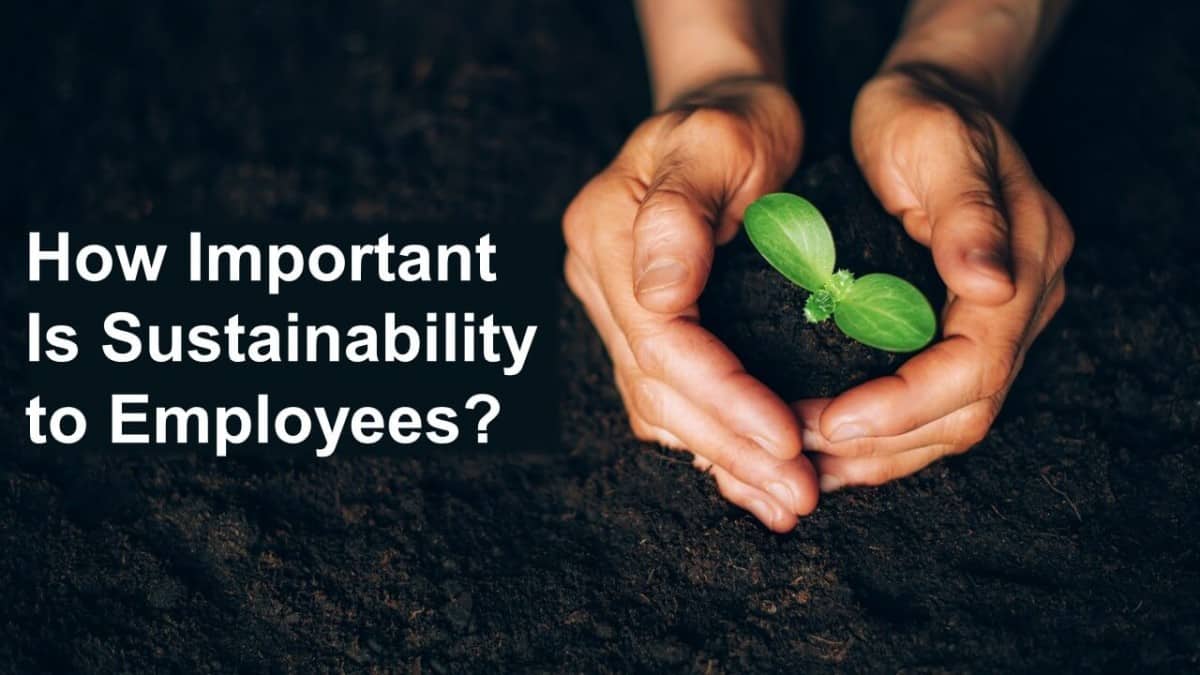Share:

Organizations that truly care about sustainability recognize the tremendous impact their practices can have on people, profits, and our planet.
They also understand the importance of implementing long-term environmentally sustainable practices now to ensure business success well into the future.
But part of a company’s long-term success depends on its ability to draw and retain top talent and engage employees who care about where their company stands on social and environmental issues.
Sustainability is very important to employees and is an important indicator of employee engagement, retention, performance, and well-being. Employees are attracted to companies that focus on sustainability as part of their business strategy because it gives meaning to the work they do.
In this article we’ll explore how important sustainability is to employees, examining the reasons why they care about sustainability and how it affects their attitudes toward employers, as well as why employers should care about sustainability too.


How Important Is Sustainability to Employees?
It takes more than paychecks and attractive benefits packages to appeal to and motivate employees these days.
Job seekers, in pursuit of next-level cultural alignment, are seeking employment with companies that have made tackling social and environmental issues part of their culture and business strategy.
According to an employee engagement study by Cone Communications, 51% of employees indicated they would not work for a company that doesn’t have strong policies addressing social or environmental sustainability issues.
According to the same study, 74% of employees said their job is more fulfilling when they’re given the chance to make a positive impact on social and environmental issues, with 70% indicating they’d be more loyal to a company that helps them contribute to solutions to these issues.
Millennials (also known as “Generation Y”), who are projected to make up about 75% of the workforce by 2025, are seeking employment with socially responsible companies.
The Cone Communications study also found that 64% of millennials won’t take a job if their employer doesn’t have a strong corporate social responsibility policy, and 83% would be more loyal to a company that helps them contribute to social and environmental issues
Other research has shown that 96% of millennial employees are not only concerned about the environment but expect their employers to take necessary steps toward sustainability.
According to a WeSpire study, there is more compelling evidence for Gen Z, who, in just a few years, are expected to make up 30% of the workforce in the U.S.
This study found that Gen Z will be the first generation to prioritize purpose over salary. They use companies’ mission and values statements to guide their employment choices because they want to work for an employer whose values match their own..
This growing segment of the workforce demands awareness and action from employers who do not demonstrate concern and real action in response to social and environmental issues.
This research strongly suggests that there are a significant number of job seekers already in the workforce who are looking for work environments and cultures that are an extension of their personal lives and reflect their values. This trend is expected to continue as younger workers enter the job market.
Why Do Employees Care About Sustainability?
Those statistics demonstrate that this is already an increasingly important issue to most employees, but it’s important to consider why we are seeing these numbers.
As our jobs have become such a big part of our lives, it makes sense that we’d want to see alignment between our personal values and those of the organizations for which we work, so it is no surprise that environmental sustainability is now a core value that employees are looking to share with their employers.
For employees to be fully engaged with their jobs, they need to feel that their work matters and that they are making a difference. They are looking to employers to help them fulfill these needs through supporting sustainable practices.
When employees see a lack of personal involvement by their leaders or even an acknowledgment that environmentally sustainable practices are not only the right thing to do but essential to well-being, this can create issues with cultural alignment for employees.
Employees who don’t see upper management consistently and continually pushing sustainability throughout the business may question whether a company values them as people if it doesn’t value the environment.
It is clear that sustainability plays an important role in motivating employees, making them feel valued, and helping them fulfill their purpose. But, perhaps most importantly, it demonstrates to employees that their leaders put people above profits and value the well-being of all people—and not just when it affects the bottom line.


Why Should Employers Care About Sustainability?
The more obvious the effects of climate change become, the more evidence we see of its very real impact on our lives and futures, the greater the need to implement more sustainable business practices.
In the push for sustainability, employers and employees can and should work together.
Employees and customers, responding to the direness of the situation, feel more and more driven to seek out companies to work for and do business with that have eco-friendly practices. Companies that want to survive must respond to these behavioral shifts.
We already know that engagement is an on-going challenge for organizations that employers have been scrambling to find ways to meet for decades. How does sustainability fit into the equation?
Mounting evidence suggests employees are more likely to be engaged when working for environmentally-friendly organizations. Supporting a culture of sustainability at every level of the organization can provide a huge boost to employee engagement.
Companies that are actively trying to make a difference in the lives of their employees and the world through sustainable business practices are gaining a competitive edge, especially with younger employees.
Companies that espouse eco-friendly cultures and business practices are also more attractive to top talent who are seeking jobs with organizations that make sustainability part of their mission and adopt sustainable practices.
Fortunately, many employers have taken up the cause and have been integrating sustainability into every employee’s position, thereby “turning a sustainable business model into business as usual.”
This makes companies better at attracting, engaging, and retaining top talent and high performers. Companies with sustainability missions who adopt sustainable practices are also doing their part to ensure the future of the company, their employees, their communities, and beyond.
Socially responsible companies that have taken real steps toward environmental sustainability are appealing to employees looking to do more than “simply punch the clock.” They are also showing a consistent and authentic level of follow-through on their cultures of care, and health and wellness in particular.
Making sustainability a priority in your organization, whether it’s apparent in how you do business with customers or through the opportunities and motivation you provide to employees to do their part, demonstrates caring leadership toward your employees, your community, and the world, and it’s an investment in the future.
A company’s ability to go beyond merely meeting regulatory compliance standards and more may determine their ability to survive. Sustainability may be one of the most important ways for leaders to connect the dots between running a successful, profitable business and taking care of people and planet Earth.

Matt Tenney has been working to help organizations develop leaders who improve employee engagement and performance since 2012. He is the author of three leadership books, including the groundbreaking, highly acclaimed book Inspire Greatness: How to Motivate Employees with a Simple, Repeatable, Scalable Process.
Matt’s ideas have been featured in major media outlets and his clients include numerous national associations and Fortune 500 companies.
He is often invited to deliver keynote speeches at conferences and leadership meetings, and is known for delivering valuable, actionable insights in a way that is memorable and deeply inspiring.


